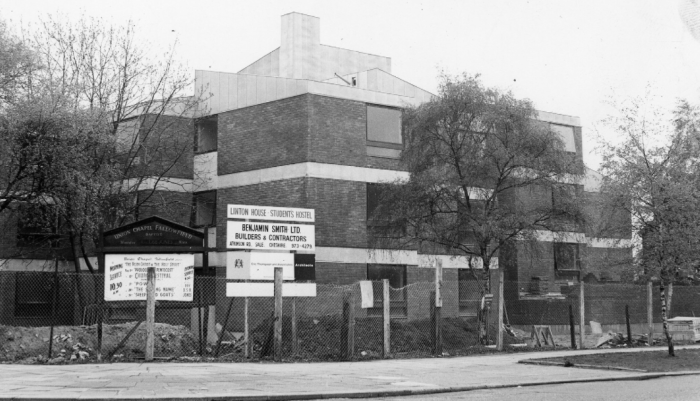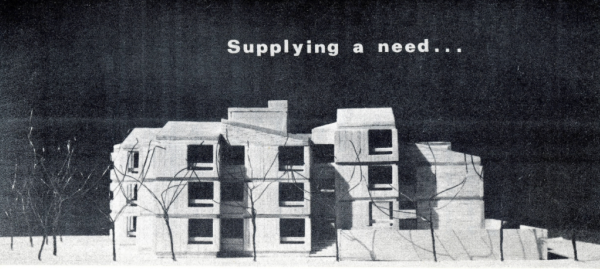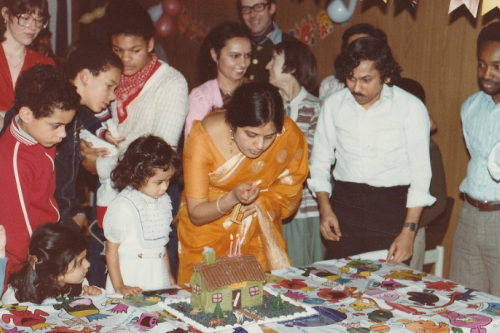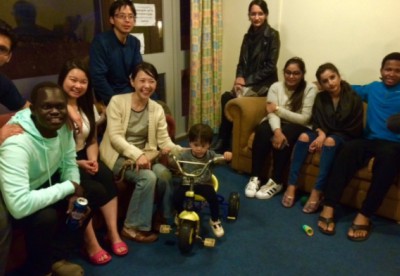'The time for compassion had come'
Fifty years ago Baptists in Manchester made the counter-cultural decision to build a hostel for marginalised foreign students. As Linton House closes, Stephen Roberts shares its story

Reading gas and electric meters and handing over bunches of keys. Hardly a dramatic ending to a 50-year long story, but a job well done and a need met is always worth marking and celebrating.
In the mid-1960s Union Chapel Fallowfield, Manchester, had a modest building, an adjacent plot of land – and a vision – to build a church to replace the edifice that had been destroyed in the war. There were plans and drawings.
But there was also a need. The church had always had strong connections with overseas, particularly Nigeria. There were small but increasing numbers of overseas students in Manchester, and at that time it was very difficult for them to find decent accommodation and a friendly welcome. White landlords would not rent rooms to students of colour, and the few who did charged exorbitant rents for appalling rooms. Rooms with a single shared bathroom in a cellar, one small calor gas stove for heating and cooking; cold, dark and dismal. It was particularly difficult for married students, or those with children.
So the idea developed that the land could be used to build a hostel for overseas students “and their wives” (female students were clearly beyond their imagination in 1964). It was not an easy decision, and of course once the (majority of!) the congregation had been won round, the neighbours needed convincing that it would not lower the tone of the neighbourhood, nor impact on the value of their property.

The original flyer
So Linton House was born. It was named in memory of the Jamaican-born activist (and deacon of Union Chapel) Joe Linton, and shepherded by John Nicholson, then minister of Union Chapel, and Norman Jones, the Area Superintendent. The Lancashire and Cheshire Baptist Association formed a Housing Association specifically to set up and run the project. Funds were raised from the British Council, loans, various Baptist and other trusts – and of course fund-raising from local Baptists, through generous donations and sponsored events, sales and an international cook book.
In 1970 the building was opened by Mark Bonham Carter, chair of the Race Relations Board. In his opening address he said, 'The Baptists were right when they decided that the time for compassion had come. And they were right to show it in such a practical form… Joining an institution, be it a university or a business was alarming in itself, but more so if it were in a foreign country, it was worse still if one had nowhere to live apart from unfriendly lodgings….
'I hope that this scheme will serve as an example and that others will follow.'
Residents referred to Linton House as “a haven”, “a life-saver”. The resident wardens, members of the church, the International Society, the chaplaincy, and the residents themselves all helped to make students – and particularly their wives - welcome with trips and cookery evenings, English classes and social events. There were regularly students from more than 20 different countries sharing the 34 rooms and small flats that made up the residence, and it was not uncommon for students whose countries were at war with each other to be amicably sharing adjoining rooms.

The 1970s were not an easy time to be running such an operation with high inflation, and particularly high interest payments on the loans, making finance difficult. Again Baptist generosity was required to keep the scheme afloat. In 1981 the running of Linton House was transferred to the then Baptist Men’s Movement Housing Association, which brought much needed expertise in building management.
By the end of the 1980s the position of overseas students had been totally transformed. The introduction of “full cost” fees by the Thatcher government had turned educating overseas students from an act of goodwill into a lucrative, and increasingly essential, source of income for universities. Student numbers had increased rapidly and larger more efficient accommodation was needed to cope with the demand.
In 1991 Linton House was transferred to the University of Manchester, which was able to provide the management and oversight to run it in this new age. Nevertheless for another 15 years Linton House remained a home for international students with a particular welcoming character, recommended from one to another down generations of students.
However, all good things have a natural life, and a building designed for specific needs in the 1960s was becoming increasingly unsuitable – shared toilet blocks, oddly configured rooms, the inevitable deterioration that goes with creative roof and drainage designs and novel use of concrete. The University closed Linton House as a student residence after the last academic year.
Union Chapel took the building and land back tin February, reading meters and collecting keys. The last thing anybody will be wanting to do with it now is to build that temple of a building in the drawings of 1963!
Nevertheless, while that vision was not followed, a need was met.

The final get together
There is also a postscript: in setting up the lease arrangements in the late 1960s the church was wise enough to consider the possibility that the need may pass – there was clearly little expectation that the home would still be useful for nearly 50 years. As part of the contingency planning they made provision for a realistic ground rent, and this has resulted in an income stream that has allowed Union Chapel to continue its mission for the past 20 years.
To commemorate the work done by Linton House, we are collating stories and memories - contact steve.roberts@manchester.ac.uk if you had anything to do with Linton House you could share or contribute, or if you just want to know more of the story. A booklet documenting its history is being produced.
Steve is a long-standing member of Union Chapel Fallowfield and an academic biostatistician at Manchester University
To view more about Linton House, visit this photo album on Flickr
Baptist Times, 02/03/2017